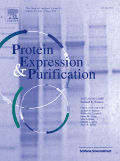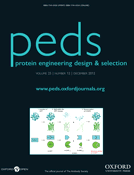
PROTEIN EXPRESSION AND PURIFICATION
Scope & Guideline
Pioneering Insights in Biochemistry and Molecular Biology
Introduction
Aims and Scopes
- Protein Expression Techniques:
The journal emphasizes various techniques for expressing recombinant proteins, including bacterial, yeast, and mammalian systems. It explores advancements in expression vectors, host cell optimization, and strategies for enhancing yield and solubility. - Purification Methods:
Key contributions involve innovative purification techniques such as affinity chromatography, ion exchange, and novel methods tailored for specific proteins. The journal presents studies that optimize purification protocols for better yield and activity. - Characterization of Proteins:
The scope includes detailed biochemical characterization of proteins post-purification. This encompasses structural analyses, enzymatic activity assessments, and the evaluation of protein properties relevant to their functional applications. - Applications in Biotechnology and Medicine:
Research often focuses on the application of expressed and purified proteins in therapeutic development, vaccine production, and industrial processes, highlighting the importance of protein engineering and modification. - Innovative Techniques and Tools:
The journal showcases emerging methodologies including CRISPR technology, synthetic biology approaches, and computational methods for protein design and optimization, contributing unique insights into protein science.
Trending and Emerging
- Advanced Protein Engineering:
There is a growing trend towards protein engineering techniques, including site-directed mutagenesis and fusion protein strategies, aimed at enhancing the functionality and stability of proteins for various applications. - High-Throughput and Automation:
Research increasingly emphasizes automation in protein expression and purification processes, reflecting the need for efficiency and scalability in biopharmaceutical production. - Applications in Vaccine Development:
With the recent global focus on vaccine development, there is a notable increase in articles related to the expression and purification of vaccine candidates, particularly those related to infectious diseases. - Nanobody and Antibody Engineering:
The rise in interest surrounding nanobodies and engineered antibodies for therapeutic applications is evident, with studies focusing on their expression, purification, and functionality. - Sustainable and Green Bioprocessing:
Emerging themes include the development of sustainable practices in protein production and purification, such as using waste materials or environmentally friendly reagents, aligning with global sustainability goals.
Declining or Waning
- Traditional Expression Systems:
There appears to be a declining focus on conventional expression systems such as E. coli for protein production, as newer systems like yeast and mammalian cell lines gain popularity due to their advantages in post-translational modifications. - Basic Purification Techniques:
Standard purification methods such as simple affinity chromatography are being overshadowed by more complex and efficient methods, leading to fewer studies focused solely on basic techniques without novel enhancements. - Non-therapeutic Applications:
Research focusing on protein applications outside of therapeutic or industrial contexts, such as basic research with no direct application, seems to be diminishing, as the journal increasingly prioritizes studies with clear practical implications. - General Reviews on Protein Expression:
The publication of general review articles on protein expression methodologies has decreased, with a shift towards more specific, detailed studies that provide actionable insights rather than broad overviews.
Similar Journals

PLASMID
Charting the course of plasmid science.PLASMID is a prestigious academic journal published by Academic Press Inc Elsevier Science that focuses on the dynamic field of molecular biology, particularly in the study of plasmids and their roles in gene function and expression. Since its inception in 1977, the journal has built a robust reputation, currently holding a Q3 category ranking in Molecular Biology and positioning itself within the 34th percentile based on Scopus metrics, making it a valuable resource for researchers and professionals alike. With an ISSN of 0147-619X and E-ISSN 1095-9890, PLASMID offers a wealth of articles that delve into cutting-edge research, facilitating knowledge-sharing and inspiring innovations in the field. Although it does not operate under an open-access model, the journal remains committed to advancing scholarly communication and maintaining high standards of academic rigor. Researchers and students engaged in biochemistry, genetics, and molecular biology will find PLASMID to be an essential platform for disseminating their findings and exploring novel ideas.

All Life
Unveiling Insights in Life SciencesAll Life is a distinguished academic journal published by TAYLOR & FRANCIS LTD, based in the United Kingdom, focusing on the interdisciplinary realms of agricultural and biological sciences, biochemistry, genetics, and neuroscience. With the ISSN 2689-5293 and E-ISSN 2689-5307, this open-access journal aims to disseminate high-quality research from 2020 to 2024, facilitating a wider reach and impact across various fields. Notably, it holds a Q3 ranking in both Agricultural and Biological Sciences, as well as Biochemistry, Genetics and Molecular Biology, and a Q4 ranking in Neuroscience, reflecting its growing presence in these disciplines. All Life aims to foster collaboration among researchers, professionals, and students, encouraging innovative approaches in understanding life sciences. By delivering timely insights and thought-provoking discussions, the journal plays a crucial role in advancing knowledge and promoting interdisciplinary dialogue in the evolving landscape of life sciences research.

Cell Reports Methods
Innovating Methodologies, Inspiring DiscoveriesCell Reports Methods is a cutting-edge journal published by CELL PRESS, focusing on innovative methodologies in the vast fields of biochemistry, genetics, biotechnology, and radiological sciences. Launched in 2021, it has rapidly ascended to attain a Q1 ranking across multiple disciplines in the latest 2023 metrics, reflecting its influential contribution to the scientific community. With an emphasis on practical and rigorous experimental approaches, this journal serves as a vital resource for researchers looking to advance their methodologies and collaborate on significant findings in their respective specialties. Despite not being an open-access publication, Cell Reports Methods ensures broad accessibility through institutional subscriptions, allowing researchers from various backgrounds to engage with high-quality scholarly work. The journal presents a unique platform for sharing insights from interdisciplinary methods that foster innovation and discovery, ultimately shaping the future of scientific research.

PROTEIN JOURNAL
Elevating Protein Research to New HeightsProtein Journal, published by Springer, stands as a significant academic resource in the fields of Analytical Chemistry, Biochemistry, Bioengineering, and Organic Chemistry. Since its inception in 1996, the journal has dedicated itself to the dissemination of high-quality research focused on protein chemistry and its biomedical applications. With an impressive impact reflected in its classification as a Q2 journal in Analytical Chemistry and Q3 in both Biochemistry and Bioengineering as of 2023, it provides an essential platform for researchers and practitioners to share their findings. The journal embraces the open-access model, enhancing accessibility to cutting-edge research. The Protein Journal is crucial for academicians, industry professionals, and students, catering to their need for rigorous scientific discourse and innovative discoveries in protein studies. With an established track record of converging over two decades of knowledge and research, it continues to influence and shape the advancements in this vital area of science.

Cell Reports
Leading the Charge in Molecular Biology InsightsCell Reports is a prestigious open-access journal published by CELL PRESS that has firmly established itself as a leading voice in the fields of Biochemistry, Genetics, and Molecular Biology. Since its inception in 2012, the journal has provided an innovative platform for rapid dissemination of cutting-edge research, ensuring that high-quality findings are accessible to a global audience. With an impressive impact factor and ranking within the top 10% in its category, as reflected by its Q1 ranking in Scopus, Cell Reports serves a vital role in advancing scientific knowledge and fostering collaboration among researchers. The journal's commitment to the open-access model not only enhances visibility but also encourages the sharing of critical advancements in molecular biology. Situated in the Netherlands, its contributions are recognized worldwide, making Cell Reports an indispensable resource for scientists aiming to stay at the forefront of their fields and facilitate breakthroughs that may shape the future of biomedicine.

Journal of Structural Biology-X
Bridging Disciplines Through Open Access ResearchThe Journal of Structural Biology-X, published by Elsevier, is a leading open-access journal dedicated to advancing the field of structural biology. Launched in 2019, it has quickly established itself as a vital resource for researchers, professionals, and students, boasting a prestigious Q1 ranking in Structural Biology for 2023 and achieving an impressive Scopus rank of #19 out of 49 in the biochemistry, genetics, and molecular biology category. With an E-ISSN of 2590-1524, this journal emphasizes accessibility and collaboration by providing open access to its comprehensive collection of research articles, reviews, and cutting-edge methodologies. The scope of the journal encompasses significant themes within structural biology, including protein structure, molecular interactions, and imaging techniques, facilitating interdisciplinary dialogue and innovation. Join the global community of scientists and contribute to the body of knowledge that propels our understanding of molecular architecture through the Journal of Structural Biology-X.

Molecular Genetics Microbiology and Virology
Innovating Insights in Virology and Molecular GeneticsMolecular Genetics Microbiology and Virology is an esteemed academic journal published by PLEIADES PUBLISHING INC, specializing in the complex interplay of genetics, microbiology, and virology. Established in 2007, this journal serves as a crucial platform for researchers and professionals committed to advancing our understanding of infectious diseases and molecular biology. Despite its current categorization in Q4 across several fields, the journal aims to evolve and foster significant discourse within the scientific community. While not an open access journal, it provides essential insights and high-quality research articles that contribute to the body of knowledge in molecular genetics and related disciplines. Located in the vibrant research landscape of New York, USA, the journal also encourages new submissions that address cutting-edge research topics and emerging trends in infectious diseases, thereby appealing to both emerging scholars and seasoned experts alike.

BIOCHEMICAL AND BIOPHYSICAL RESEARCH COMMUNICATIONS
Pioneering research for a deeper understanding of life sciences.BIOCHEMICAL AND BIOPHYSICAL RESEARCH COMMUNICATIONS, published by Academic Press Inc Elsevier Science, stands as a leading periodical in the fields of biochemistry, biophysics, cell biology, and molecular biology. With an ISSN of 0006-291X and an E-ISSN of 1090-2104, this esteemed journal has been a pivotal platform for the dissemination of groundbreaking research since its inception in 1959, continuing to publish influential findings through at least 2024. It holds a commendable Q2 ranking in Biochemistry and Q1 status in Biophysics as of 2023, reflecting its high impact and relevance in the field, supported by its strong Scopus rankings—ranking #43 in Biophysics and maintaining a presence in the top quartiles of several related categories. Although it is not an open-access journal, it provides critical insights and essential data that cater to researchers, professionals, and students keen on advancing their understanding of complex biochemical and biophysical processes. Its significant contributions to the scientific community underscore the importance of this journal as a reference point for innovative research and collaborative discourse.

PROTEIN ENGINEERING DESIGN & SELECTION
Bridging Theory and Practice in Biochemical ResearchPROTEIN ENGINEERING DESIGN & SELECTION is a leading journal published by Oxford University Press that focuses on the intricate field of protein engineering, encompassing biochemistry, bioengineering, and biotechnology. With an ISSN of 1741-0126 and E-ISSN 1741-0134, this journal aims to disseminate groundbreaking research and innovative methodologies related to protein design and selection, enhancing our understanding of molecular biology and its applications in medicine and industry. With an established record from its inception in 1986 to the present, it maintains a significant influence in the academic community, reflected in its categorization in Q2 across various fields in its latest 2023 metrics. Although it is not an open-access journal, it offers invaluable insights and robust peer-reviewed contributions that are essential for both experienced researchers and emerging scholars in the field. The journal aspires to not only advance scientific knowledge but also to engage with real-world challenges through collaborative research and innovative practices, reinforcing its position in the evolving landscape of biotechnology and protein sciences.

CRITICAL REVIEWS IN BIOCHEMISTRY AND MOLECULAR BIOLOGY
Illuminating the Complexities of Molecular BiologyWelcome to Critical Reviews in Biochemistry and Molecular Biology, a premier academic journal published by Taylor & Francis Ltd, dedicated to advancing the fields of biochemistry and molecular biology. With an impressive impact factor and a Q1 ranking in both Biochemistry and Molecular Biology for 2023, this journal serves as a vital resource for researchers, professionals, and students eager to engage with cutting-edge reviews and analyses that synthesize the latest developments in these dynamic areas of study. Since its inception in 1972, the journal has maintained a commitment to high-quality scholarship, providing a platform for critical discussions that accelerate the discovery and understanding of biochemical processes and molecular interactions. Although not open access, its robust editorial peer-review process ensures that published articles meet the highest standards of scientific rigor, making it a trusted source for the scientific community. As we continue to converge toward 2024, we invite you to explore the extensive array of topics and findings that have shaped contemporary biochemistry and molecular biology.